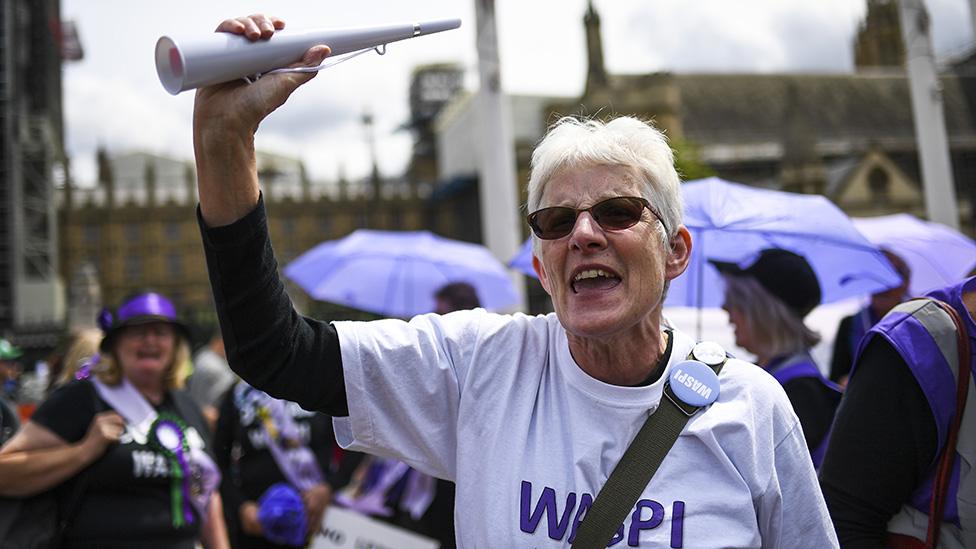Women hit by state pension age rise push for £10,000 compensation
- Published

Women born in the 1950s hit by the state pension age change are owed compensation and the government should "do the right thing", a report says.
It suggests women should receive a payout of between £1,000 and £2,950. But campaigners want £10,000 each.
The ombudsman has been looking at whether women were properly informed of the rise in state pension age to bring them into line with men.
The government said it would consider the report and respond in due course.
But the ombudsman said that up to now the Department for Work and Pensions (DWP) had "clearly indicated it will refuse to comply" on its payout proposal, which it said was "unacceptable".
While the Parliamentary and Health Service Ombudsman (PHSO) can recommend compensation, it cannot enforce it.
"The Department must do the right thing and it must be held to account for failure to do so," the PHSO said.
Michele Carlile told the BBC she was shocked to find out she wasn't eligible for the state pension when she retired just before her 60th birthday.
"It has had a terrible effect. Right at the start I had no way of paying my mortgage, I had to go and stay with my son so I could rent my property."
While she is hopeful of getting compensation, she said the figures mentioned in the report were "highly disappointing".
Failure to communicate
The age at which people receive the state pension has been increasing as people live longer, and currently stands at 66 for men and women.
But for decades, men had received their state pension at 65 and women at the age of 60.
Under the 1995 Pensions Act a timetable was drawn up to equalise the age at which men and women could draw their state pension. The plan was to raise the qualifying age for women to 65 and to phase in that change from 2010 to 2020.
But the coalition government of 2010 decided to speed that up. Under the 2011 Pensions Act the new qualifying age of 65 for women was brought forward to 2018.
The increases have been controversial. Campaigners claim women born in the 1950s have been treated unfairly by the rapid changes and the way they were communicated to those affected.
Many thousands said they had no idea they would have to wait longer to receive their state pension, and had suffered financial and emotional distress as a result.
Michele Carlile had no way of paying her mortgage
While the PHSO has recommended compensation, the DWP does not agree.
"What DWP has told us during this investigation leads us to strongly doubt it will provide a remedy," the ombudsman's report says.
It added that it was taking "the rare but necessary step of asking Parliament to intervene".
A DWP spokesperson said: "The government has always been committed to supporting all pensioners in a sustainable way that gives them a dignified retirement whilst also being fair to them and taxpayers."
Shadow home secretary Yvette Cooper said Labour would "look really closely" at the report, but would not be drawn on whether Labour would compensate affected women should they get into government.
'The clock is ticking'
Angela Madden, chair of the campaign group Women Against State Pension Inequality (Waspi), said: "I'm pleased the report is finally out. This investigation has gone on for five long years. I'm pleased that [the ombudsman] recognises there has been injustice."
Waspi had called for compensation of £10,000 or more per woman, which for the 3.6 million women it claims were affected, would total £36bn for the government, an amount Ms Madden acknowledged would be "huge".
But, she said: "The government saved £181bn by sneaking this in through the backdoor, by trying to get away without actually telling us, because I'm sure that that was a political choice."
Pat Pollington fears delays in receiving any compensation
Pat Pollington, 70, had to work four years longer than she had planned to get her pension after a career working with technology and then renewables firms.
She said that despite the ombudsman's recommendation, there was no guarantee that the government would pay compensation, and even if it did, delays could see some women die before they receive their payouts.
"It may not help me," she told the BBC. "Once you've got women going into their 70s, you've got a lot less time. There will be women who've passed away before we get this money.
"The clock is ticking. The longer [the government] prevaricate, the less women they'll have to pay out to."
Ms Carlile in London, who was born in 1954, retired from a senior role in education at the age of 59 after suffering a heart attack.
"It's good that they're recommending compensation, for sure, but I would definitely be expecting more than that which has been suggested," she said.
- Published21 March
- Published21 March